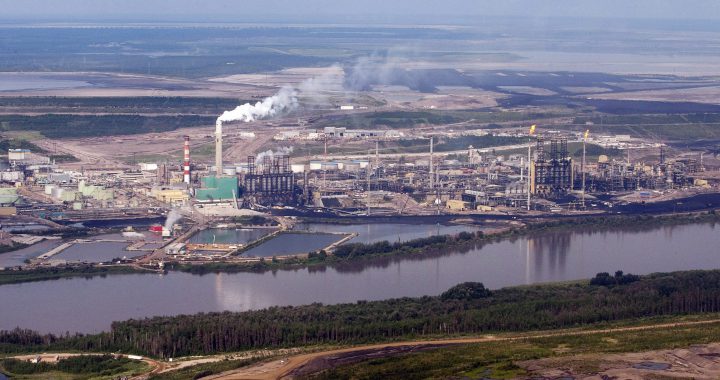The three countries in the North American Free Trade Agreement are to vote on whether to investigate if Canada is failing to enforce environmental legislation on tailings ponds in Alberta’s oilsands.

The vote is required after the trade treaty’s environmental watchdog concluded there were serious questions about how the federal government enforces the Fisheries Act in relation to the giant ponds.
Studies have suggested the ponds leak water containing tailings from oilsands production into the Athabasca River.
The ponds are estimated to hold 1.3 trillion litres of contaminated water.
“Canada’s response does not provide sufficient information about why Canada did not undertake enforcement actions,” said the finding from the Commission on Environmental Cooperation.
NAFTA allows non-governmental organizations and citizens of the three countries to submit complaints if they believe that environmental laws and regulations are not being enforced.
READ MORE: NAFTA talks enter make-or-break week amid gridlock on critical issues
Watch below: Freeland says no deal yet, but parties committed to get NAFTA agreement

If the commission determines the concerns are well-grounded, the member countries have 60 days to vote on whether to hold an investigation called a factual record. That record does not include recommendations or conclusions.
The commission began its examination after a 2017 complaint from the Natural Resources Defense Council, Environmental Defence Canada and a member of the K’ahsho Got’ine Dene First Nation.
They assert that no company has ever been prosecuted for allowing pond water to leak into and contaminate the Athabasca River. A 2014 Environment Canada study backed suspicions that leaks were occurring when it “fingerprinted” toxins found in groundwater and matched them to chemicals in the tailings.
That study didn’t quantify how much was leaking. Previous studies estimated it at 6.5 million litres a day.
The complaint is similar to one filed in 2010.
That went to a vote in 2014. Canada persuaded its fellow NAFTA members that a factual record wasn’t needed because a Canadian court was considering similar issues — even though that case had been withdrawn.
That action is no longer a factor, said Dale Marshall of Environmental Defence.
“That case has been entirely put to bed,” he said.
The second complaint also contains new information.
“When we resubmitted, we updated it with new information that had come, including that 2014 ‘fingerprint’ study,” said Marshall.
The submission cites other studies, many from industry, that conclude at least some tailings water was escaping into local creeks. Under the Fisheries Act, it is illegal to release a “deleterious substance” into any body of water containing fish.
Canada has argued the fingerprint study was not conclusive. It says it’s still working to develop scientific tools for future investigations and that significant advancements have been made.
It also says repeated inspections of the ponds were made between 2009 and 2014.
“In 2014, following five years of effort to inspect tailings ponds with no reasonable grounds to support violations of the act, (Environment Canada) redirected its proactive enforcement efforts toward other regional and national issues,” says the government submission.
That submission doesn’t refer to any research more recent that 2013.
Although NAFTA requires the vote to be held within 60 days, that deadline has been ignored in the past.
Marshall acknowledges that even if Canada was eventually found not to be enforcing its own laws, the consequences are slight.
“There’s not a lot of repercussions, other than public shaming.”



Comments